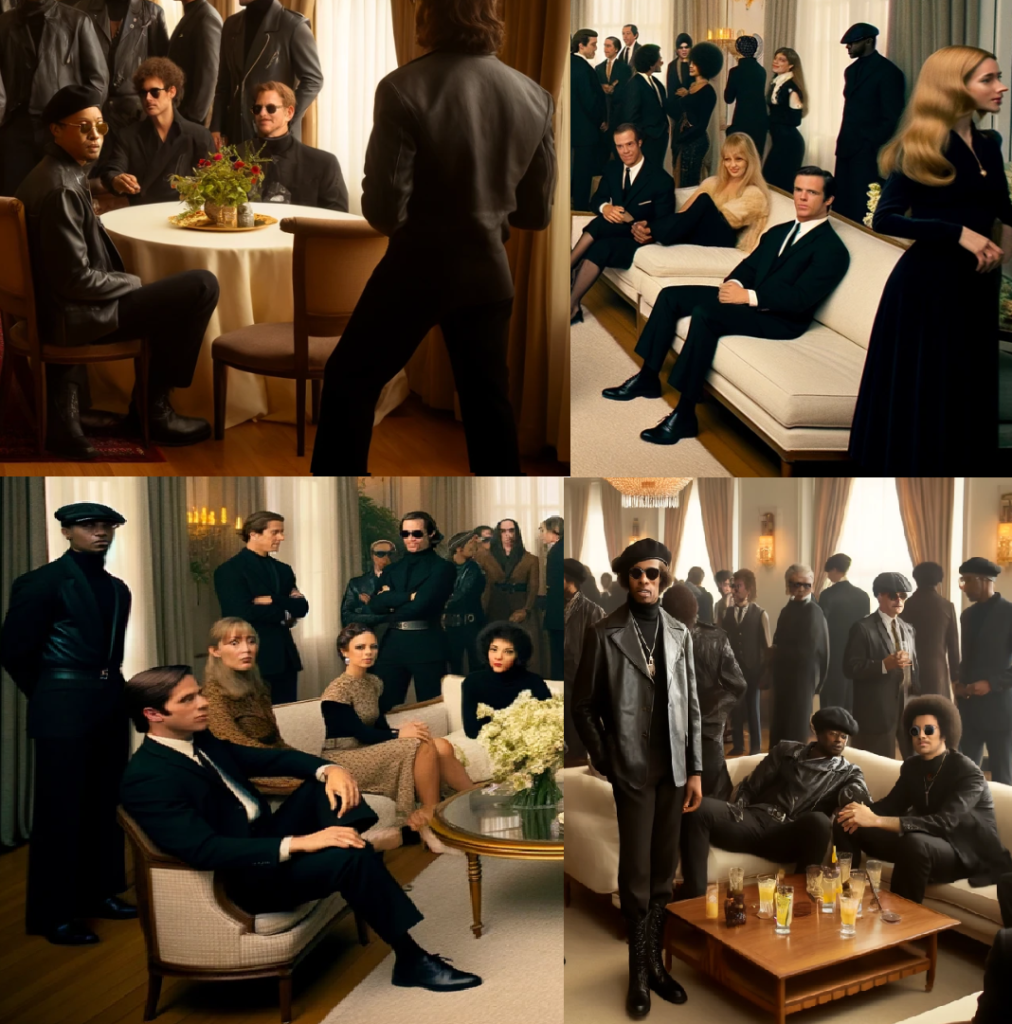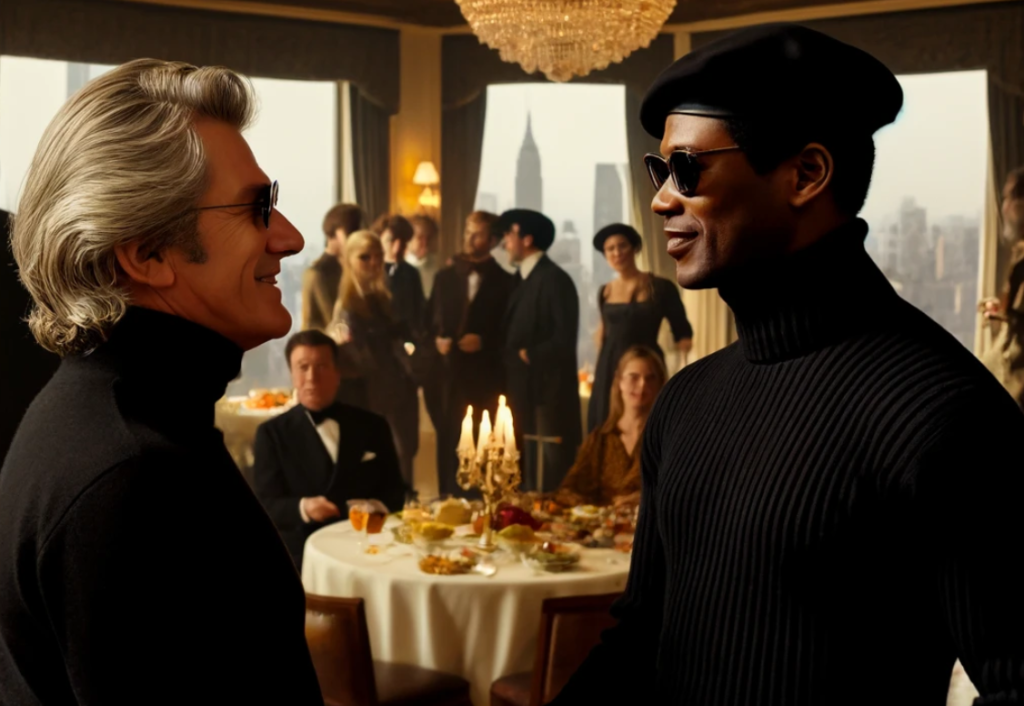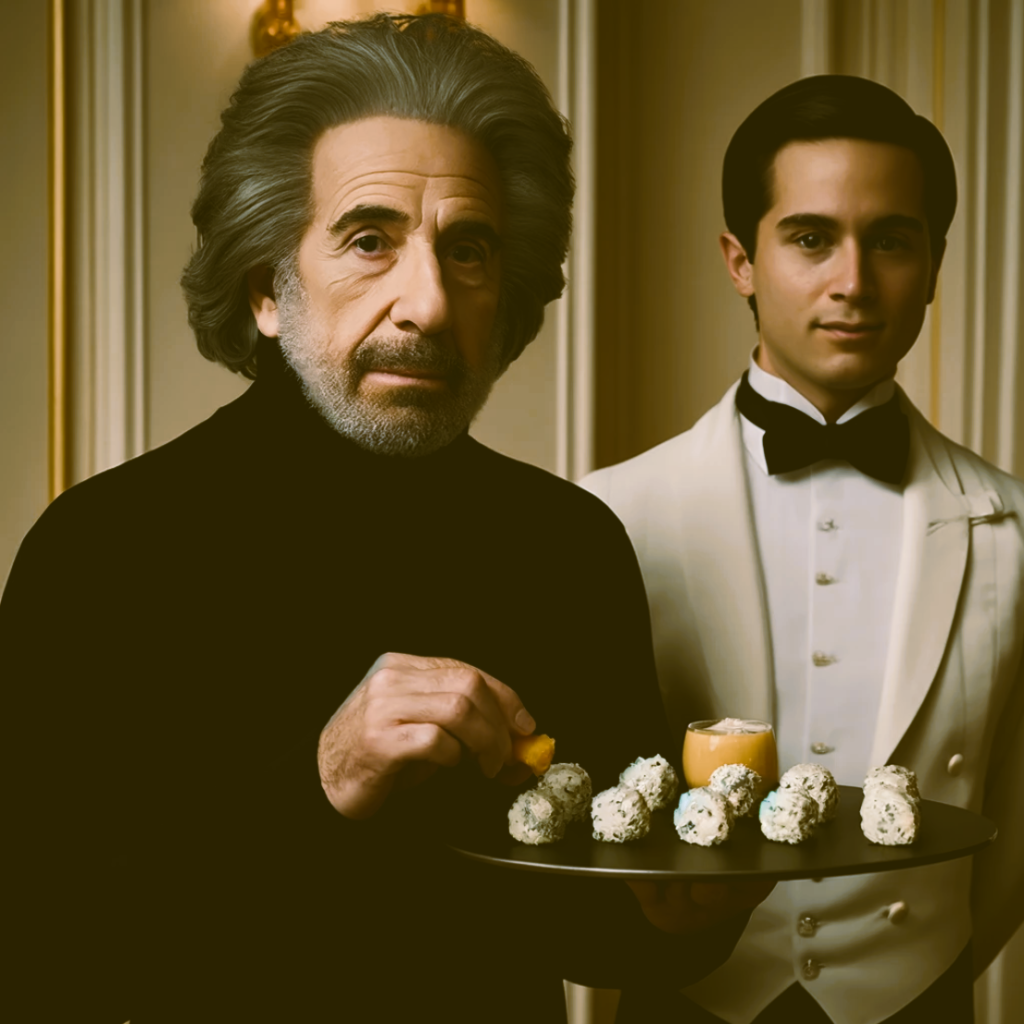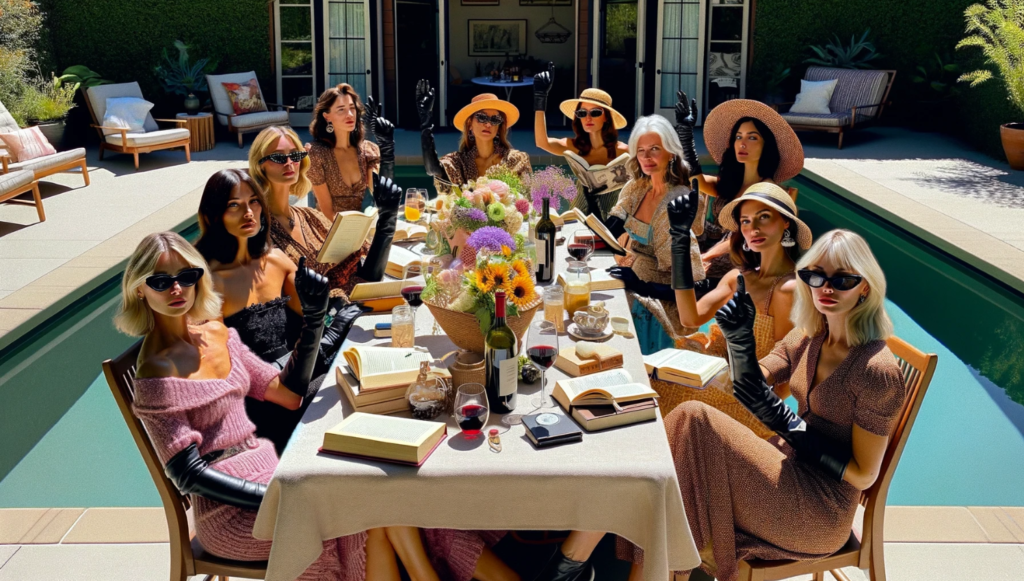
The Radical Chicness of it All
While they sip champagne and nibble on canapés, outside, the real world burns.
Written by Winston Smith ©2024
Sparked by the Netflix documentary Radical Wolfe, which explores the life and seminal works of journalist Tom Wolfe, we may find ourselves shocked and disheartened by the direct connections between the performative activism Wolfe critiqued in 1970 and its modern counterparts in today’s woke culture. The scenes and sentiments Wolfe depicted in his account of a high-society fundraiser for the Black Panthers aren’t just relics of a bygone era. They resonate profoundly with today’s woke Hollywood circles and dominate the conversations of upper-middle-income book club ladies.
This cyclical pretense of white guilt and performative activism, as Wolfe laid bare, is an enduring script, replaying itself in modern contexts. His portrayal of elite society’s flirtation with radical causes, driven by a mix of guilt, thrill, and a desperate need for social validation, mirrors the trends we witness now. It’s this repetitive cycle, this historical echo that compels us to reexamine the parallels from Wolfe’s era to our own.
If you haven’t read the article or book, here are some reflections from ‘Radical Chic’, and how it still resonates in the current socio-political climate and the peculiar ways white guilt continues to shape conversations and actions in our society.
Radical Chic, a term coined by Tom Wolfe in his article of the same title published in New York Magazine in 1970, chronicling a party, er… fund raiser, er… discussion- hosted by Leonard and Felicia Bernstein at their 13-room penthouse duplex on Park Avenue. It’s a commentary on status contradictions and incongruities.
You can call it… elegant slumming.

When you read Tom Wolfe’s ‘Radical Chic’, a first reaction could be one of astonishment at the audacity of these self-proclaimed saviors hosting fundraising galas in their gilded penthouses, presenting their systemically oppressed guests of honor: members of the Black Panther Party, who were there to raise money for a legal defense fund for the Panther 21. The Panther 21 were 21 Black Panther Party members who were accused of conspiring to blow some shit up, then were locked up at Rikers and held on bonds so outrageously high, they could be considered ransoms rather than bail. (Footnote: all members of the Panther 21 were subsequently found not guilty). As for the hosts and their righteous cronies, well It’s like watching peacocks’ parade in a minefield, oblivious to the irony of their own strutting.
These well-intentioned, guilt-fueled do-gooders, with their champagne flutes and practiced, sedated smiles, were fueling a powder keg of a situation, blissfully unaware or perhaps willfully ignorant they were one click of a gold Dupont lighter away from… KAAAAA-BOOOOOM!

The Panthers, all decked out in leather, dark shades, and stoicism, wove through a jungle of crystal, silk, and silver platters bearing dour cheese morsels rolled in savory nuts – mirroring the room’s tenor, itself a symphony of contrasts, a fusion of Classical and Jazz, privilege, and struggle – and there, amidst the clink of glasses and the soft murmur of sympathy, lay the unspoken truth: were these elites helping, or merely appeasing their own gnawing sense of guilt? The whole charade read like a twisted Dali-esque landscape of societal farce, where the surreal becomes the real, and the real becomes an absurd footnote in the pages of the privileged.
One might envisage a palpable air of curiosity, emanating from those time-worn pages, a question: Is this what it looks like when men and women of such dire circumstances with holes in their pockets are no longer relegated to peering through the glass windows of pastry shops? As for those milky spectators and their checkbooks, yet another occasion for self-congratulatory pats on the back.

As the attendees sized up their leather clad guests of honor donning felt berets, who were strangers to these gilded lairs of grand pianos lined with million-dollar chatchka –attention must have shifted from sizing them up to concern for the wellbeing of the silverware and other pricy objects small enough to inconspicuously slip into the pocket of a leather jacket- and whether or not these valuables would survive the night. You can bet that question was secretly on the mind of most of these opulent anarchists, followed by the weird masochism of the white liberal. Can you envision the penance they’d subject themselves to after having these intrusive thoughts? A likely scenario involves scolding an easily targeted, conveniently clueless bigot—a quick fix to polish their veneer of righteousness. Doubtful they’d engage in any self-admonishment, as they’d be more inclined to brush off those concerns as outdated programming they’ve since renounced, opting instead to confront some ‘lesser thinker’ or indulge themselves in some other form of virtue-signaling later on.

Try to conjure it, there, in the thick of things, Bernstein – that’s ‘stein,’ not ‘steen’ – playing the grand host, introducing the Panther hierarchy to the Park Avenue elites, like it’s some VIP petting zoo, tossing a Roquefort cheese rolled in nuts hors d’ oeuvres to the back of his throat, washing it down with a quaff of Dom Perignon, then loudly exclaiming, “Qu’ils mangent du fromage” while grossly gesticulating, as only egregio maestros can do. After all, who can truly empathize on an empty stomach?

Make no mistake about it, it was no coincidence that the house staff, dressed in formal black uniforms with hand pressed aprons, were all white South Americans. Oh, the Bernstein’s understood the optics all right, that a shitstorm might have ensued had they hired black servers instead! But did they, for a minute, consider a black man or woman would have happily taken this gig to feed their family but were discriminated against, just so the hosts could avoid the appearance of being prejudice?
Now get this: The Bernstein’s became the “go-tos” for procuring pallid domestic help and were referred to on the Avenue as the ‘Spic n’ Span’ agency. The irony, thicker than the helps’ accents.
Fast forward to the present day, transitioning from Wolfe’s historical context to our contemporary moment, where it is crystal clear – the ghosts of white guilt and performative activism is still lingering in the air, as we find a strikingly similar tableau unfolding in the sterilized enclaves of suburbia.

This modern echo of Wolfe’s ‘Radical Chic’ raises questions about the effectiveness of such activism in driving real societal change. While the intentions may be noble, the execution often falls short, serving more as a testament to personal virtue than as a catalyst for meaningful progress.
From this microcosm, within conspicuously white neighborhoods marked by their manicured lawns and manufactured concern—situated close enough to the fringes to catch a whiff of the horror yet far enough removed to avoid its stain—a coven of upper-middle-income women convenes for their monthly book club. Here, from the comfort of lavish living rooms, they passionately speak of street battles and systemic oppression, their empathy sincere yet curiously abstracted from the gritty realities of those they speak for. These are women whose lives are insulated by wealth and privilege, yet they grapple with issues of racial inequity as if they were on the front lines doling out atomic elbows and face slams off the buckle, so much like the theatrics of professional wrestling, also known for its exaggerated, performative nature.
As the corks popped and the wine flows like a crimson tide, their tongues loosened, unleashing a torrent of guilt drenched in desperate, virtuous tones, each sentence laced with the kind of hollow righteousness that only comes from a lifetime of cushioned ignorance. They speak of injustice and struggle from the comfortable confines of their manicured existences.

Someone amongst the group always shifts the conversation, even if it is only tangentially relative, toward the suffering of the classes – and this isn’t just a topic of discussion; it’s the very air they breathe, an ever-present force permeating every conversation. While they speak of systemic racism and institutional inequity, their voices dripping with empathy but devoid of understanding, the subjects of their sympathy are conspicuously absent at these affairs, unlike that party at Lenny’s.
And as they patted themselves on the back for their enlightened views, outside their bubble, the world churned on, unfazed and uncaring about the theatrics of the privileged trying on struggle like a costume. In this theater of the absurd, the real issues were merely a backdrop to their self-congratulatory performance.
These ladies of leisure, would they ever trade their charmed lives for a real walk on the wild side? Pull their children out and over the ivy-covered walls of elite prep schools like a SEAL team 6 extraction, then take up residence in the black and brown neighborhoods of the oppressed and financially desperate? Not on your life! That would render them bereft of all those feel-good stories of self-abasement that spice up their book club soirées.
In this grand charade, from the high-rise elitism of the grand tapestry of social facades of the gilded penthouses and bygone hipster elites, to the manicured lawns of today’s bored suburbanite, the patterns are unmistakably repetitive, the lament, familiar. With their champagne and caviar fueled empathy– they continue unabated, these masquerades of concern, history repeating itself with new actors reading from old scripts.

As the final cork pops and the last echoes of white guilt fade like cigarette trails dissipating into the ethers until that next grand party or comfortable book club gathering, one is left to ponder the true nature of change and the enduring allure of comfort over the discomfort of genuine engagement.
The lessons of the past, it seems, suggest progress is never met, just merely detained. And these lessons are destined to be relearned, not in the pages of history, but in the living rooms of the present, where a parade of pretense masquerading as the empathy of the privileged, plays on, its cast ever oblivious to the irony of their performance. And so, the cycle spins like a Maytag washing machine as predictable as it is disheartening, leaving in its wake not the seeds of change, but the lingering, unfulfilled promise of what could be if only the script were truly rewritten.


Leave a Reply